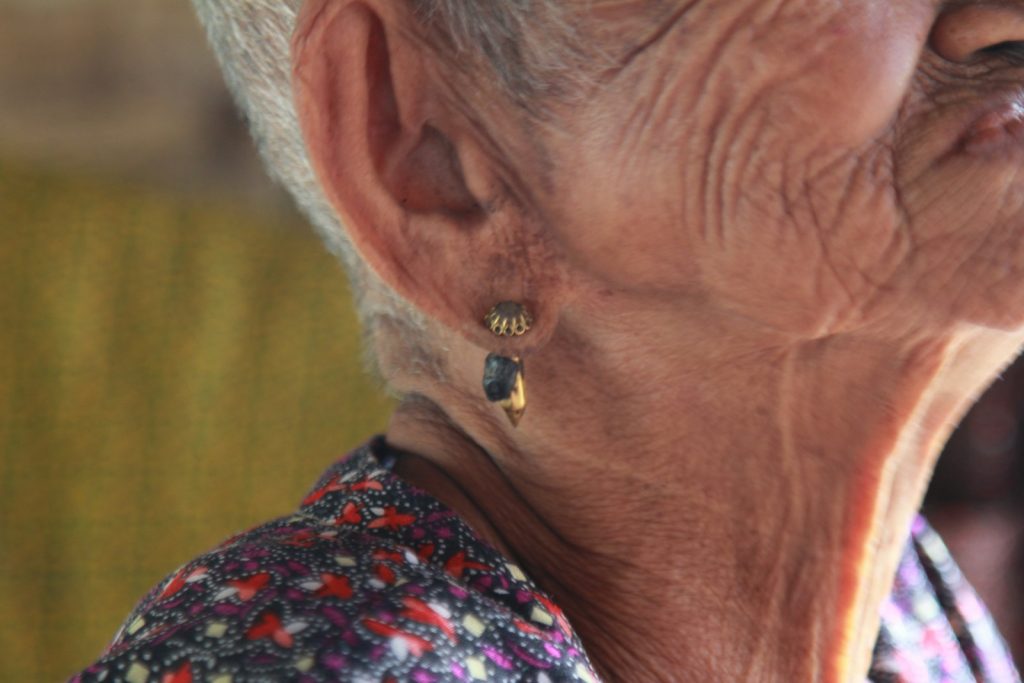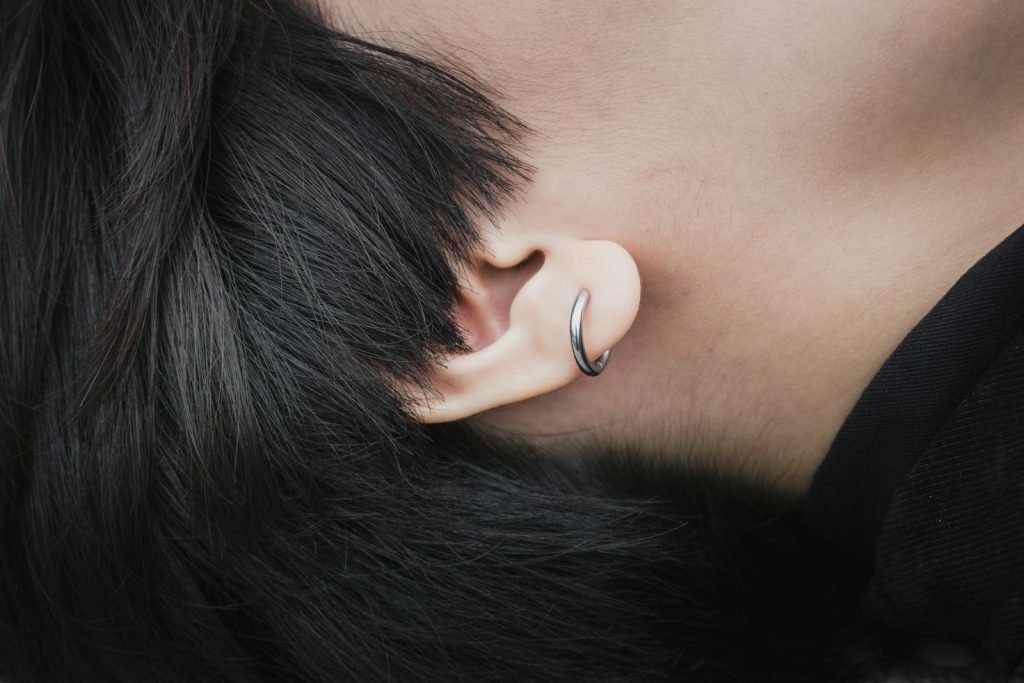|
Getting your Trinity Audio player ready...
|
Ear piercings are a popular form of self-expression and have been for centuries. However, with the beauty and individuality they bring, there’s also the potential risk of an infected ear piercing. Whether you’re dealing with your first piercing or are a seasoned pro, knowing how to treat an infection effectively is crucial. This blog will guide you through understanding, treating, and preventing infections, as well as the importance of proper aftercare and the role of clear earrings for sports.
Understanding Infected Ear Piercings

What Causes an Ear Piercing Infection?
An infected ear piercing can occur due to various reasons, including:
- Bacterial Contamination: The most common cause of an ear piercing infection is bacteria. This can be introduced during the piercing process if the equipment isn’t sterile or after the piercing if the area isn’t kept clean.
- Touching with Dirty Hands: Frequently touching your piercing with unwashed hands can transfer bacteria to the area, increasing the risk of infection.
- Allergic Reactions: Some people are allergic to certain metals, especially nickel, which can lead to an infection if used in earrings.
- Improper Aftercare: Not following proper aftercare instructions, such as failing to clean the piercing regularly or using the wrong cleaning solutions, can lead to an infected piercing.
- Trauma or Injury: Any physical trauma to the piercing, such as accidentally pulling on the earring or getting it caught on clothing, can create an open wound that becomes infected.
Symptoms of an Infected Ear Piercing
Recognizing the symptoms of an infected ear piercing early on is essential for timely treatment. Common signs of an infection include:
- Redness and Swelling: It’s normal to experience some redness and swelling immediately after getting a piercing. However, if these symptoms persist or worsen, it may indicate an infection.
- Pain or Tenderness: Pain that doesn’t subside or becomes more intense over time could be a sign of an infection.
- Pus or Discharge: A yellow or greenish discharge, especially if it’s thick and accompanied by a foul odor, is a clear indication of an ear piercing infection.
- Warmth Around the Piercing: Infected areas often feel warm to the touch, a sign that your body is fighting off the infection.
- Itching or Burning: Persistent itching or a burning sensation around the piercing could also indicate an infected piercing.
How to Treat an Infected Ear Piercing
If you suspect an ear piercing infection, it’s essential to act quickly to prevent the situation from worsening. Here’s how to clean an infected ear piercing and manage the infection effectively.
Step 1: Clean the Area Gently
The first step in treating an infected ear piercing is to keep the area clean. Here’s how to do it:
- Wash Your Hands: Always start by washing your hands with soap and water to prevent introducing more bacteria to the area.
- Use a Saline Solution: Soak a cotton ball or pad in a saline solution (saltwater) and gently clean the area around the piercing. Avoid using alcohol or hydrogen peroxide as they can be too harsh and delay healing.
- Pat Dry: After cleaning, gently pat the area dry with a clean tissue or paper towel. Avoid using towels that might harbor bacteria.
Step 2: Apply an Antibacterial Ointment
After cleaning, applying a topical antibacterial ointment can help fight off the infection. Be sure to use a product recommended by your piercer or healthcare provider. Avoid using ointments that contain harsh chemicals or steroids unless prescribed, as they can irritate the skin further.
Step 3: Avoid Removing the Earring
One common question is whether you should take out your earring if the piercing is infected. In most cases, it’s best to leave the earring in place. Removing it can cause the piercing hole to close, trapping the infection inside. Instead, focus on cleaning the area and keeping the earring in to allow for proper drainage and healing.
Step 4: Monitor the Infection
Keep an eye on the infection over the next few days. If the symptoms improve, continue with the cleaning routine until the infection is fully resolved. However, if the infection worsens, or if you develop symptoms like fever, chills, or spreading redness, seek medical attention immediately.
The Importance of Clear Earrings for Sports
If you’re active in sports or other physical activities, clear earrings for sports are a great option to consider. These earrings are typically made from hypoallergenic materials like plastic or silicone, reducing the risk of an ear piercing infection.
Why Use Clear Earrings?
- Hypoallergenic Materials: Clear earrings for sports are often designed for people with sensitive skin, reducing the chance of an allergic reaction.
- Comfort and Safety: These earrings are designed to be comfortable and less likely to cause injury during physical activities. They are also less noticeable, which can be important in certain sports settings.
- Prevention of Infections: By wearing clear earrings made from safe materials, you reduce the risk of introducing irritants that can lead to an infected ear piercing.

Home Remedies for Treating an Infected Piercing
In addition to the steps outlined above, there are several home remedies that can help soothe and treat an infected ear piercing.
1. Saline Solution
As mentioned earlier, saline solution is one of the best and safest ways to clean an infected piercing. You can make your own by mixing 1/4 teaspoon of non-iodized salt with 1 cup of warm water. Use this solution twice daily to clean the infected area.
2. Tea Tree Oil
Tea tree oil is known for its antibacterial and anti-inflammatory properties. Dilute a few drops of tea tree oil with a carrier oil like coconut or olive oil, and apply it to the infected area with a clean cotton swab.
3. Warm Compress
Applying a warm compress to the infected area can help reduce swelling and promote drainage. Simply soak a clean cloth in warm water, wring out the excess, and place it on the affected area for a few minutes.
4. Chamomile Tea Bags
Chamomile has natural healing properties that can help soothe an infected piercing. Steep a chamomile tea bag in hot water, let it cool slightly, and then place it on the infected area. The warmth combined with the chamomile’s healing properties can provide relief.
When to Seek Medical Attention
While most ear piercing infections can be treated at home, there are times when professional medical attention is necessary.
1. Persistent Symptoms
If the infection doesn’t start to improve within a few days of home treatment or if the symptoms get worse, it’s time to see a doctor. Persistent pain, swelling, or discharge are signs that the infection may need more aggressive treatment.
2. Systemic Symptoms
If you develop symptoms like fever, chills, or body aches, this could indicate that the infection has spread beyond the piercing site and requires immediate medical attention.
3. Red Streaks or Increased Redness
If you notice red streaks extending from the piercing site or the redness continues to spread, this could be a sign of a more serious infection, such as cellulitis, which requires prompt medical care.
Preventing Ear Piercing Infections
The best way to deal with an infected ear piercing is to prevent it from happening in the first place. Here are some tips to keep your piercing healthy and infection-free.
1. Choose a Reputable Piercer
Always get your piercings done by a professional piercer in a clean, reputable establishment. Ensure that the piercer uses sterile equipment and follows proper hygiene practices.
2. Follow Aftercare Instructions
After getting a new piercing, follow the aftercare instructions provided by your piercer carefully. This typically includes cleaning the piercing regularly with saline solution and avoiding touching it with dirty hands.
3. Avoid Irritants
Be mindful of the materials in your earrings. If you have sensitive skin, opt for hypoallergenic earrings to reduce the risk of an allergic reaction that could lead to an infection.
4. Wear Clear Earrings for Sports
As mentioned earlier, clear earrings for sports are a great option if you’re active. They help minimize the risk of irritation and injury, which can lead to an ear piercing infection.
Frequently Asked Questions (FAQs)
How do I treat an infected ear piercing?
To treat an infected ear piercing, start by cleaning the area with a saline solution twice a day. Avoid using harsh chemicals like alcohol or hydrogen peroxide, which can irritate the skin. Apply an antibacterial ointment if recommended by your healthcare provider, and avoid removing the earring unless instructed to do so by a professional. Monitor the infection, and if it doesn’t improve within a few days, seek medical attention.
Should I take my earring out if it’s infected?
In most cases, it’s best to leave the earring in place if your piercing is infected. Removing the earring can cause the hole to close, trapping the infection inside. However, if your healthcare provider advises removing the earring, follow their guidance.
Will an infected ear piercing heal on its own?
Mild infections may heal on their own with proper care, such as regular cleaning and avoiding irritants. However, more severe infections require treatment, and ignoring the symptoms could lead to complications. It’s always better to address an infection early to prevent it from worsening.
Is an infected ear piercing serious?
An infected ear piercing can become serious if left untreated. While many infections are mild and can be treated at home, some can spread or cause more severe health issues. If you experience symptoms like fever, spreading redness, or severe pain, seek medical attention immediately.
Conclusion
Treating an infected ear piercing requires prompt attention and proper care. By recognizing the symptoms early, maintaining a clean environment, and using appropriate treatments, you can effectively manage and heal an ear piercing infection. Clear earrings for sports and following good aftercare practices can also help prevent infections from occurring in the first place. Remember, when in doubt, consult a healthcare professional to ensure your piercing heals correctly and safely.



